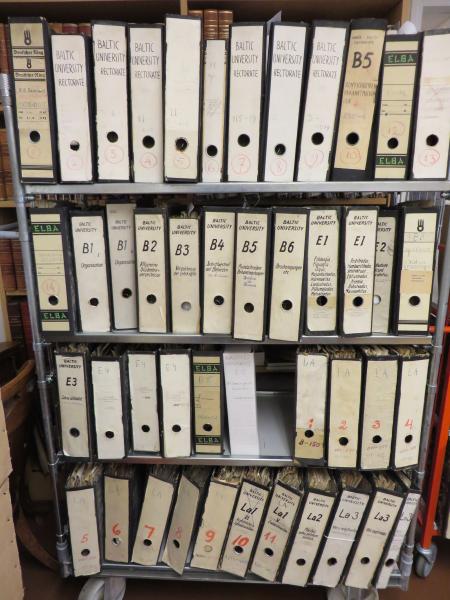
She e-mailed that things went well in Sweden. To avoid confusion, below is a slighly edited version of her communication.
Merits wrote: “A few weeks ago I was in Uppsala to do research in the archive of the Baltic University (Hamburg 1946-1949). Until I could see the archive with my own eyes I was somewhat worried whether it would be really there – as even Raimo Raag (University of Uppsala), Enn Nõu and Alexander Loit (both living in Uppsala) hadn’t heard about it.
In the Estonian book about the Baltic University by Elmar Järvesoo it is written that it is unknown where the archive is. A German researcher (Marcus Velke) who wrote his master thesis about the Baltische Forschungs Institut (operating in Bonn, 1949 -1972) where some of the former professors of the Baltic University worked, didn’t know about it either.
So I was both excited to travel to Uppsala and a bit worried – having only a few days to study the archive I had invited some people who could read either Estonian, Latvian or Lithuanian to help with the research. The librarian of the Uppsala University Library had written me about 47 boxes with material. But I thought that if there was so much material others would have known about it.
To my great relief the archive of the Baltic University was there – indeed 47 boxes with material. The librarian told me he didn’t know about it until I wrote him, as it was not catalogued. He tried to find out for me when it came to the library and why, but could not find any document about this. On the boxes was written Latvian Fund, but the Latvian Fund in Sweden didn’t know about it either.
The archive of the Baltic University turned out to be a goldmine of information – concerning the university, the functioning of UNRRA and later IRO and rules and regulations concerning refugee camps in the British zone.
Back home I wondered who had given me the information to try to find material in the Uppsala University Library – as this was quite a while ago. I found out that it had been Tartu University Library. They sent me documents about the BU and wrote me these had come from Uppsala.
Advertisement / Reklaam
Advertisement / Reklaam
Last week I visited the library in Tartu and heard they didn’t know either these documents were part of such a large archive.What they did know was this:
`The materials of Estonian sector in Uppsala Library were sorted out by Jüri Leps (he worked in the manuscripts department UL).J. Leps organized the transfer of the materials of Estonian Sector to our library. Unfortunately, he had no further details too.’
(This was, if I’m well informed, in 2002).
Further more the librarian of Tartu University Library wrote that`All property, including the archive, remained in custody of Eduards Sturms, the last President of the BU . ‘
The German researcher, Marcus Velke, wrote me about this the following:
`I can only tell you this: 1953, when the Baltic Research Institute started its work in Bonn, Sturms was obviously not in the possession of the Baltic University Archives; as a proof you find as attachment two "Bescheinigungen" saying so. Sturms went from Hamburg to Bonn about 1952 to obtain a "Gastprofessur" in prehistoric history - if he ever was in the possession of the archives he maybe was not able to take it with him to Bonn and thus agreed to let it go to Uppsala. But this is just speculation; in Bonn I could not find any further hints concerning the archives .’
In the mean time I asked the National Archives in Stockholm whether they could find anything about the archive, but their response was negative. So far it remains a mystery how the archive ended up in Uppsala, but there are still a few institutions, a few more people I can ask, so I hope to find out when and why the archive arrived there, but most important: it is really there.”
(EWR)

